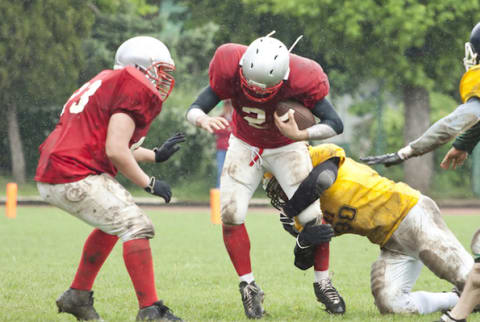Advertisement


As America’s most popular sport, football is a big part of life for many of us. Boys in the United States start playing pee wee football around age 6, and by high school, 1 million are competing. Anyone who’s watched or participated in this game knows it’s intense. Players charge each other at full speed, and helmets collide. Eventually, this constant head trauma led to questions about its effect on the brain. The resulting research has been shocking.
Not surprisingly, initial investigation found that concussions sustained in football led to lower cognitive performance. More disturbing, however, is newer information showing that professional football players have four times the risk of developing neurodegenerative conditions like Alzheimer’s and amyotrophic lateral sclerosis (ALS). Now, the most recent data highlights the neurological complications of football on our brain’s memory center. Put aside your team’s statistics, because these numbers are far more important.
The latest study on football-induced neurological damage comes from the well-respected Journal of the American Medical Association. When starting this trial, researchers understood that concussions and head trauma were associated with worse cognitive performance. They decided instead to focus on long-term effects of these skull impacts on football players, looking at changes in actual brain anatomy. To see the physical effects of football on the brain, they chose to study the hippocampus.
Allowing us to create new memories and contributing to our IQ, the hippocampus is anything but trivial. This is the part of our brain damaged in Alzheimer’s disease, with injury leading to memory problems and disorientation. Basically, it’s essential to normal human function. In this study, the volume of the hippocampus was measured and compared between college football players. Athletes with a history of concussion had a significantly smaller hippocampus than those without. What’s more, each year of prior football experience predicted an increasingly smaller hippocampus.
This data is very worrisome, as it closely parallels our understanding of the brain in Alzheimer’s. In fact, scientists use measurements of hippocampal shrinkage as an indicator of Alzheimer’s progression. In both Alzheimer’s disease and in this study, the hippocampus shrank far more than would be expected for normal age-related atrophy.
On the opposite side of the field, we do have evidence for ways to prevent these complications. Beyond the benefit of optimal protective equipment, we know oxidative stress plays a big role in brain degeneration. New research suggests that an antioxidant-rich diet may help prevent these damaging processes in the brain. We also know that high homocysteine levels are associated with increased risk of developing cognitive decline, and that vitamin B supplementation lowers these levels. Finally, we know that the supplementation with the omega-3 fatty acid DHA may slow brain degeneration, as well as exert a protective role against the effects of traumatic brain injury.
All together, the information is frightening. As adults, we should be allowed to make our own decisions, and professional athletes accept danger as part of their vocation. However, these brain problems are beyond what’s understood as part of the contract. Even more importantly, there are more high school and college athletes playing football than any other sport. These students may be exposed to tremendous long-term neurological risk without their knowledge. The studies on this subject are ongoing, but for the many children starting or continuing their journey with tackle football, the complications may be developing now. Whether you’re a parent or a player, take a moment and look at the research; it may be gamechanging.
Take-Home Points:
- Playing football may increase risk of multiple brain conditions including Alzheimer’s, ALS, and cognitive decline.
- Playing football may lead to smaller hippocampal size, an effect that increases with years playing the sport.
- Antioxidant rich foods, adequate vitamin B, and omega-3 supplementation may be neuroprotective and help treat existing damage.
- Anyone playing tackle football should wear the safest available equipment, individually fitted to the player, in good condition, and meeting all safety standards.
Watch Next
Enjoy some of our favorite clips from classes
Enjoy some of our favorite clips from classes
What Is Meditation?
Mindfulness/Spirituality | Light Watkins
Box Breathing
Mindfulness/Spirituality | Gwen Dittmar
What Breathwork Can Address
Mindfulness/Spirituality | Gwen Dittmar
The 8 Limbs of Yoga - What is Asana?
Yoga | Caley Alyssa
Two Standing Postures to Open Up Tight Hips
Yoga | Caley Alyssa
How Plants Can Optimize Athletic Performance
Nutrition | Rich Roll
What to Eat Before a Workout
Nutrition | Rich Roll
How Ayurveda Helps Us Navigate Modern Life
Nutrition | Sahara Rose
Messages About Love & Relationships
Love & Relationships | Esther Perel
Love Languages
Love & Relationships | Esther Perel

















